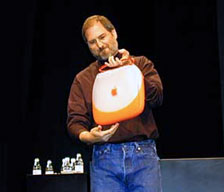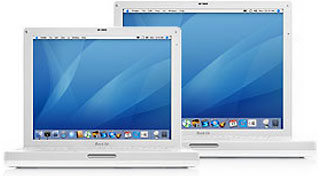Call me a fool. After all, it was only April Fools’ Day on Sunday. But it was Easter on Sunday too, and on the theme of rising from the dead, could Apple be resurrecting one of its old products in a new form?
Now, before we continue on this road together, let’s get one thing straight. I’m not an analyst, nor am I privy to any insider information on forthcoming products from Apple (although most of my friends seem to think I do). But allow me to entertain you just the same.
Here’s where my hypothesis originates from.
There has been talk in recent years that Apple may be designing a new hybrid touch screen enabled Mac, and while this has been discussed with an iMac in the past, I’m referring to rumors of a notebook computer that would be a cross between a MacBook and an iPad Pro.
Apple in a way has already toyed with the idea in the form of a touch bar on the 15″ MacBook Pro, but this is more of a gimmick and obviously not a full size touch screen encompassing the entire display.
This hybrid computer would feasibly run iOS, the touch-based operating system with OS X at its core (as the late Apple CEO Steve Jobs said originally about iOS when the iPhone was unveiled in 2007).
Of course, being a hybrid touch-based device might naturally mean that its operating system also would be a hybrid as well, a cross between iOS and Mac OS. The best of both worlds.
Either that or the ability to switch between both environments on the fly based on your computing needs and whatever task you happen to be performing at the time. That would be more ideal. The simplicity of iOS in a tablet with all the power of Mac OS in a notebook computer, all rolled into one device.
Assuming its operating system was strictly iOS, it wouldn’t be a full-fledged Mac and would be, in my opinion, more of a low-end notebook computer. To be competitive, it would have to be priced somewhere between the entry level versions of the iPad Pro ($649) and the 12″ MacBook ($1,299).
When you think about it though, a hybrid notebook computer that only ran iOS doesn’t really seem very plausible for Apple to make when users can already buy any version of the iPad for sale and add a keyboard case to the device, turning it into a notebook computer of sorts. It seems more likely that Apple would choose to go the route of switching between environments or creating a hybrid OS for such a device.
If it’s any indication, a reputable source in the business world reports that Apple is planning to in essence port all of its iOS apps to run seamlessly on Mac OS. If that’s not a look into the crystal ball of what Apple has in store for its future pipeline of products, in this case a hybrid OS, then I’m reading the tea leaves wrong and maybe I am indeed a fool. But I digress.
So what would this hybrid Mac potentially be called?
Say Hello Again to… the iBook?
In a recent Macworld article by former editor-in-chief Jason Snell, the topic of Apple renaming its products and removing the lower case “i” moniker from them – specifically in this instance changing “iBooks” to simply “Books” – is what got me thinking about my supposition.

Steve Jobs unveils the iBook at the Macworld Expo in New York on July 21, 1999.
What if the reason Apple was taking back the name originally used for its consumer notebook computer line and then for its e-book products is because they plan to re-introduce the iBook in a new and modern form?
It has been close to two decades now since Apple released the first iteration of the iBook. The product was announced in July 1999 (watch the video) and finally sold later that year in September. Labeled by applehistory.com as a low-end machine due to Apple omitting key features found in its high-end PowerBook line, the iBook was, according to their description, the most anxiously awaited Apple computer ever.

The 12″ and 14″ models of the iBook G4.
Geared to be a consumer grade product, the iBook would be revised three more times after its initial debut changing from the 12″ iMac-looking clamshell design to the more traditional rectangle form factor in an all-white 12″ model in 2001, adding a 14″ version in 2002, and then keeping the same shape but changing its processor from a PowerPC G3 to a G4 in 2003. The line would be discontinued entirely in May 2006 with Apple’s move to Intel-based processors and the introduction of the 13″ MacBook, which replaced the iBook.
Calling a new hybrid notebook computer configured with a touch screen, whether solely running iOS or a combination of it and Mac OS, would seem to make sense with the little “i” in front of the “Book” name.
Since the computer would be something that Apple has never released before, they would need a new name for the product. And what better way to do this than to delve into the past and use an iconic name like iBook?
“You already know iPhone, iPad, and iPod touch. Now meet the newest iOS device in Apple’s lineup. Introducing the all new iBook.”
Does that sound awesome or what? And wouldn’t it be great to release this next generation of the iBook 20 years after the original? I’m getting giddy just envisioning the prospect!
In fact, the original iBook was considered a hybrid computer itself being a melding of a PowerBook and an iMac. If that isn’t reason enough to label a new iOS-based hybrid touch screen notebook computer from Apple, an iBook, then I don’t know what else to call it.
Then again, maybe a better name would be MacBook touch. No?
What do you think of this possibility? Would “iBook” be an appropriate name to reuse and tack it on a new product? And what about a hybrid Mac? Do you like the idea, and would you buy one? Finally, which operating system would be right for such a device? Just iOS or a hybrid mix of iOS and macOS?
Share your thoughts by leaving a reply below or join our Facebook group to post your comments.
keywords: #leoandmac
short link: https://goo.gl/gGicXs

